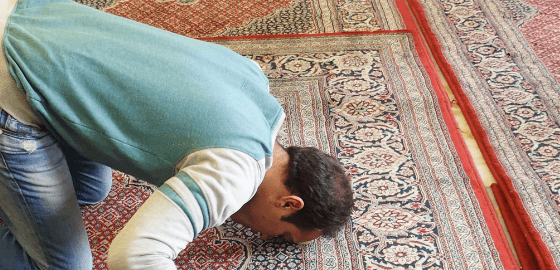This is the second article in the series on protection duas. You can read the first article here.
We are in need, every single second, of the assistance and protection of Allah. We sometimes forget this as we get caught up in this worldly life. As we go about our days enjoying the good things of this world, we take our safety and protection for granted. A simple habit that can assist us in preventing this neglect is to recite the recommended supplication duas every morning and evening.
As we grow in spirituality, it is important to increase our good deeds and add more beneficial habits to our daily routine. The daily protection duas are an excellent habit to build, and there are many benefits to reciting these duas every single day. By making dua daily, we remember Allah more, increase our Tawakul, and experience the inner peace of being under Divine Protection.
FAQ about protection duas
What are the daily protection duas?
The daily protection duas are a series of duas found in various authentic hadiths that we are encouraged to recite every morning and evening. The best collection of these duas is Hisn al-Muslim (Fortress of the believer) which is available on various websites and even as an app for the phone. I highly recommend downloading this book so that you have access to the full list of duas whenever you need to recite them.
What is the Fiqh ruling on these duas?
These duas are mustahab/sunnah (recommended). This means that there is a lot of reward, virtues, and benefits for reciting them daily, but there is no sin for not reciting them. If you live in a community in which people have forgotten about this practice, then by starting this habit and encouraging others to do so as well, you can also gain the reward of reviving a Sunnah practice.
When should I recite these duas?
The best time to recite morning duas is immediately after Salah al-Fajr. This can form part of one’s morning ritual to increase the amount of time spent in the remembrance of Allah at the start of the day. It also helps turn one’s day into a day filled with barakah (blessings). There is a difference of opinion on whether the evening duas should be recited after Asr or Maghrib. My opinion is that it should be recited after Maghrib as that is when the evening begins, and Allah knows best.
What are these duas for protection from?
These are comprehensive duas that serve for protection from every known evil. If you read through the translations of these duas, you will realize that there isn’t anything that has been left out. These include duas for protection from disbelief, misguidance, jealousy, magic, poverty, debt, helplessness, and evil eye. I highly recommend taking time to read through the translations of these duas and reflecting on their meanings.
What are the benefits of reciting these duas every day?
These duas provide several daily benefits. They form part of our daily good deeds, adding to our scale on the Last Day. May Allah accept our deeds. They increase our daily remembrance of Allah, which increases our Taqwa (God Consciousness). These duas provide a sense of inner peace as one feels safe in the protection of Allah. Through this, they form part of having Tawakul in Allah, as we ask Allah daily to protect us and that is an important aspect of Tawakul. Another benefit of these duas is that help us appreciate the good things in our lives, as they include words of praise for Allah and gratitude. Finally, the most obvious benefit is that they protect us from all forms of evil including crime, violence, poverty, and most importantly misguidance.
Some of the most important protection duas
Every dua in this list is important, but some have a greater significance than others. From among the most important protection duas is Ayat al-Kursi. Every believer should try to memorize this dua and recite it after Fajr and Maghrib. Even better than this, we should try to build the habit of reciting it after every Salah.
“Whoever recites Ayat al-Kursi after every Salah, the only barrier between him and paradise is death.”
Sunan Nasa’i, Hadith: 9848
Next in importance are the three Quls i.e. the last three Surahs of the Quran. These should be recited three times each, before blowing on oneself. Surah al-Ikhlas serves as protection from disbelief. Surah al-Falaq causes protection from worldly afflictions like jealousy and crime. And Surah al-Nas serves as protection from misguidance and the devil. We should memorize and recite these Surahs every morning and evening, as well as before going to sleep at night.
Another important dua is the following;
اللّهُـمَّ ما أَصْبَـَحَ بي مِـنْ نِعْـمَةٍ أَو بِأَحَـدٍ مِـنْ خَلْـقِك ، فَمِـنْكَ وَحْـدَكَ لا شريكَ لَـك ، فَلَـكَ الْحَمْـدُ وَلَـكَ الشُّكْـر
O Allah, what blessing I or any of Your creation have risen upon, is from You alone, without any partner, so for You is all praise and unto You all thanks.’
The above dua serves as an expression of gratitude to Allah for all of His favors upon us, those that we know and those that we do not realize. It is just as important to thank Allah for His blessings, as it is to seek His protection. We sometimes forget to show our gratitude, and this dua can serve as a daily reminder to do so.
These are just a few examples of some of the important duas that every believer should strive to make part of their daily routine. Our lives are for Allah, and so we should fill it with the remembrance of Allah. The Sunnah protection duas are one of many ways to make the daily remembrance of Allah a constant in our lives.






